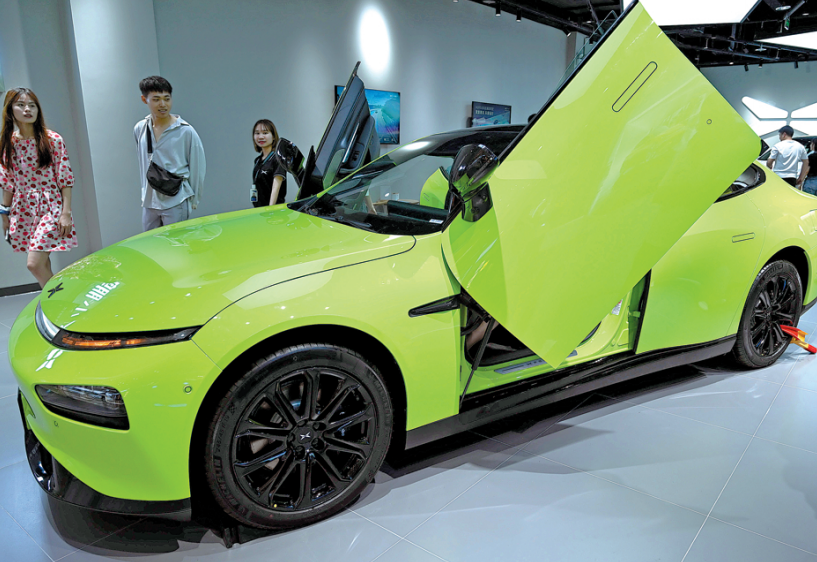NEV firms hit in pocket despite growing sales


Nio, Xpeng and Li Auto report mixed results due to supply problems and R&D expenses
China's top three new energy vehicle startups all reported strong sales in their second-quarter financial results released recently. However, there remain troubling signs as heavy financial losses and chip shortages continue to destabilize the sector.
Nio's revenue in the first quarter hit 8.45 billion yuan ($1.31 billion), up 127.2 percent from the same period last year, according to its financial statement. Its net loss was 587.2 million yuan in the quarter, down 50.1 percent year-on-year.
Xpeng's deficit widened eight times in the second quarter this year to 1.2 billion yuan. Its revenue jumped more than sixfold to 3.8 billion yuan.
Meanwhile, Li Auto reported a net loss of 235.5 million yuan in the second quarter, narrowed 34.6 percent compared with the first quarter, but twice as higher compared with same period last year.
Its revenue rose 41 percent to 5.04 billion yuan compared with the first quarter and 158.8 percent year-on-year due to surging vehicle sales.
Li Auto delivered 17,575 of its Li One, the firm's only sales model, in the second quarter, representing a 40 percent gain from the first quarter and a 166 percent increase from a year earlier.
Nio delivered 21,896 vehicles in the second quarter this year, up 9.2 percent compared with the first quarter and 111.9 percent year-on-year.
Xpeng sold more than five times the number of vehicles in the second quarter than the year before, and 30.4 percent more than in the previous quarter, at 17,398 units, the report said. It delivered 30,738 vehicles in the first half, more than the whole of last year.
Compared with the other two companies, the sales growth of Nio slowed due to chip shortages and unstable supply chains. Some parts of Nio vehicles are made in Malaysia, Germany and Nanjing, East China's Jiangsu province, which have been affected by COVID-19 and natural disasters.
In terms of net loss, Xpeng's is twice as high as Nio's and five times higher than Li Auto's.
Xpeng explained that higher marketing expenses to support sales as well as the cost of expanding its sales network caused administrative expenses to nearly double to 1.19 billion yuan in the second quarter from a year earlier.
Besides this, spending on research and development nearly tripled to 863.5 billion yuan in the second quarter this year, largely due to the hiring of additional staff and pay rises. The company plans to expand its R&D cost to 4 billion yuan this year.
R&D is of great significance to startups. Statistics show that Nio and Li Auto spent 883.7 million yuan and 653 million yuan on R&D respectively in the second quarter this year.
Nio CEO William Li said the company will invest 5 billion yuan on R&D this year and the R&D team is expected to double in size by the end of this year.
Li Auto also said it will spend at least 3 billion yuan on R&D this year. It will reach 6 billion annually in the next three years with more investment on autonomous driving and new models.
More new models are to be delivered with the growing investment. Nio said it will develop three new models based on the NT 2.0 platform, including the ET7 sedan next year.
Xpeng plans to introduce at least three new models a year from 2023, Chairman He Xiaopeng said. Top-of-the-range prices will increase to as much as 400,000 yuan from the current 300,000 yuan as the electric vehicle maker moves into the high-end market.
Li Auto plans to launch its first model based on the X platform next year and another two new models in 2023.
Shen Yanan, co-founder and president of Li Auto, said that each new model will involve an investment of around 2.5 billion yuan. Its gross profit rate this year is expected to reach 19-20 percent. But the company will not be profitable for a long time in terms of net profit, he said.
Despite the expanding losses, Xpeng is not short of cash, it said. The company raised HK$15.8 billion ($2 billion) in its secondary listing in Hong Kong in July. It listed on the Nasdaq in the United States in August last year.
And Xpeng is not alone. Li Auto raised HK$11.6 billion last month. It is also on the Nasdaq and considering an initial public offering in the Chinese mainland.
Nio submitted its application for a secondary listing in Hong Kong in March, but it has yet to be approved by the Hong Kong Stock Exchange due to Nio's user trust holdings, Tencent News reported. The carmaker was the first one of the three to go public in 2018.




































